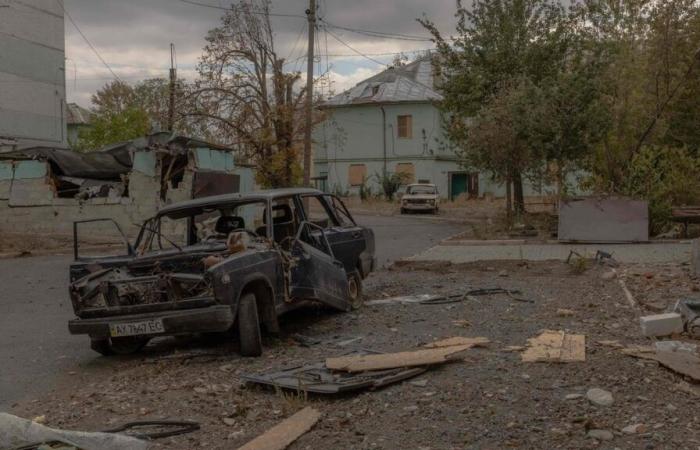The United States’ decision to supply antipersonnel mines to Ukraine is “unjustifiable,” NGOs denounced on Wednesday, pointing out the long-term consequences for civilians of these internationally banned weapons, even if they aim to slow down the advance. Russian on Ukrainian territory.
• Also read: “Disastrous decision”: antipersonnel mines supplied by the United States for Ukraine
• Also read: Ukraine criticizes the closure of embassies: the Russian threat is “daily”
Buried or hidden on the ground, antipersonnel mines explode when a person approaches or comes into contact with them, often causing mutilation if not death.
They “do not know how to differentiate between soldiers and civilians” and continue to explode long after their installation in contact with farmers or even children, deplores Alma Taslidzan, of the NGO Handicap international, interviewed by AFP .
These weapons are “not ethical”, regrets this expert from Bosnia-Herzegovina, a country where, she says, “contamination (from mines) remains massive 30 years after the war”, despite millions of euros spent to clear mines. .
Some 164 states and territories, including Ukraine, signed the 1997 Ottawa Convention on the Ban and Elimination of Anti-Personnel Mines. But neither Russia nor the United States have ratified this text.
The Russian army has also used these explosives “widely” on Ukrainian territory since the large-scale invasion in February 2022, with “at least 13 types of antipersonnel mines deployed,” points out a global report published Wednesday by the Observatory mines.
“Credible information” also indicates that Ukrainian forces used them, notes this research arm of the International Campaign to Ban Landmines (ICBL), a network of non-governmental organizations.
Dead and injured
According to this report, at least 580 Ukrainians were killed or injured by antipersonnel mines or explosive remnants in 2023, making Ukraine the fourth country in the world most affected by this scourge.
While the Ukrainian army seems to be on the decline in the face of Moscow’s forces, supporters of these mines “could argue that they serve as a defense tool to slow down or block the invading forces”, estimates Alma Taslidzan.
But the “long-term consequences (…) outweigh the short-term military benefits,” she says, and it is therefore “unjustifiable” to use these weapons which will continue to strike civilians “for years and years.” decades after the conflict.
According to Washington, those sent to Kyiv will be “non-persistent”, that is to say equipped with a self-destruction or self-deactivation device supposed to limit civilian losses over the long term.
However, these “self-destruction or self-deactivation mechanisms are not 100% reliable” and provide no absolute guarantee that they will not explode when civilians pass by or, later, when deminers are present. work, believes Ms. Taslidzan.
Especially since the United States stopped using antipersonnel mines in 1991, stopped exporting them in 1992 and producing them in 1997, underlines Mary Wareham, of the NGO Human Rights Watch.
“Obsolete” mines?
The explosives intended for Ukraine are therefore “obsolete antipersonnel mines still in American stocks”, at least 27 years old, whose “batteries deteriorate with age”, the expert explains to AFP, who says she is “not even sure that (they) will work as expected”.
Under Barack Obama, the United States had decided “not to extend or modify the life of the batteries” of these mines which were “to expire in the early 2030s,” she recalls.
The Biden administration then announced in June 2022 that it was renouncing their use outside the Korean peninsula, pledging to no longer develop, produce or export them.
And Mary Wareham found it “staggering that the White House now seems to be reversing its own policy of eliminating antipersonnel mines in order to transfer them to Ukraine, which itself is a member of the treaty banning them.”
Even if these weapons were effective in preventing Russian troops from advancing, “chemical” or “nuclear” weapons would also be effective “and yet we are not taking that path,” she insists.
The financial and military support of the United States for Ukraine, “indispensable”, according to the HRW expert, must not free it “from the rules of war”.
“Certain weapons have been deemed unacceptable in the eyes of the world and under international humanitarian law, and anti-personnel landmines are one of them,” she says.
For Washington to put them back into practice would “really weaken” the Ottawa Convention and “give an excuse to other states to also violate the treaty,” fears Alma Taslidzan of Handicap International.
The American decision is “disastrous”, wrote the International Campaign to Ban Landmines (ICBL) in a press release sent to AFP. “Ukraine must make it clear that it cannot and will not accept these weapons.”






